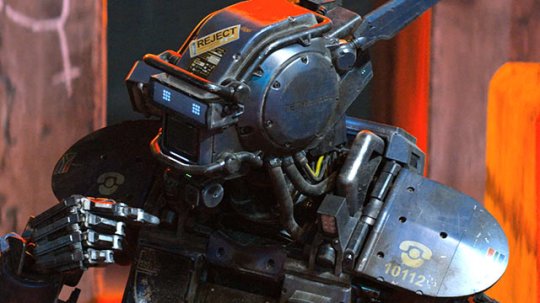The pitfalls, dangers and misadventures of creating artificial intelligence have been common themes in film for years – for this reason, perhaps, Chappie completely forgoes those perils and decides to look at the positives instead. Witnessing the birth of an AI and watching it learn, develop and grow (both in intellect and character) is utterly fascinating – this basic concept provides some great groundwork for Neill Blomkamp’s latest sci-fi blockbuster.
At the heart of it is the titular hero – the innocent and almost painfully cute Chappie. Undoubtedly, some will find the robot’s childlike mindset annoying (or maybe even frustrating?) but there’s no denying the appeal – seeing Chappie copy He-Man’s sword wielding exploits is unashamedly heartwarming. Sharlto Copley’s skill in bringing the character to life will probably be overlooked by many (he provided voice and motion capture for Chappie); it really shouldn’t be.
Built around the character is a plot which rarely thrills or offends – it’s fairly standard sci-fi fare. Deon Wilson’s (Dev Patel) fleet of police robots has helped restore order to the crime-ridden streets of Johannesburg and his employers Tetravaal are experiencing phenomenal growth as a result. Rather than complain about the fact he doesn’t have his own office though, Deon simply goes home everyday to work on his AI project; not long into the movie, he succeeds and bids to insert his finished experiment into one of his police droids.
On the way though, he’s kidnapped by the band Die Antwoord, who apparently enjoy indulging in criminal activities when off tour – that might sound like a joke but bizarrely, they really do seem to be playing fictionalised versions of themselves. Anyway, they need money so they plan to steal some money but they need to shut the police robots off first so they can steal the money and so they kidnap the guy who made the robots and so it goes on; the pair have their moments but for the most part, their side of the story is impressively uninteresting.
Hugh Jackman’s role in the film is spectacularly disappointing too. As Vincent, he’s the main villain of the piece (hardly surprising – have you seen the mullet he’s rocking?) but he’s awfully one-dimensional and rather petulant too; much of his anger towards Deon simply stems from his robot being inferior to the police scouts. The film gives no background to the character and there seems to be little reason for his deep loathing towards Deon and his prized AI; it vaguely states that Vincent used to be a soldier at one point, like that’s an excuse to be a complete arsehole.
The plot’s a bit thin then but it does convey some great messages and themes. Blomkamp’s District 9 was highly acclaimed for its depiction of xenophobia and social segregation and some of those themes are lurking in the background of Chappie too. The film never directly confronts them (perhaps for the best) but it frequently dives into the murky crime underworld of Johannesburg, offering glimpses of the struggles people face in the city.
Violence is used beautifully by the film to illustrate just how unwelcoming this world can be. Chappie’s police scout body gets him into a spot of trouble with a gang of youths and Blomkamp effectively utilises slow-motion to really shock the viewer – the audience might view Chappie as an innocent, loveable child but the people of Johannesburg definitely don’t.
This also ties into the visual pleasures that the film provides; the Vodacom-advertising Ponte City Apartments (already a popular filming spot) provide several interesting scenes and Ninja’s hideout is awash with neon colour – Die Antwoord’s influence on the film must have been an inspiration here.
Unfortunately, in the final half an hour or so, the film falls apart. It stumbles from one far-fetched event to the next, throwing every loose plot thread into the mix in a vague hope that the end result will satisfy all; sadly, it fails. Most disappointing of all, though, is Blomkamp’s decision to suddenly allow ultra-violent influences to creep in; the film hypocritically begins to revel in the bloody violence that it seemingly condemned earlier, as though it desperately needs something exciting to keep the action movie fans happy. Even putting aside the divisive final plot events, the ending is a bitter disappointment.
Thankfully, the earlier, more intriguing moments of Chappie are strong enough to prevent the movie from turning into a total dud. There’s a real heart to the film and a lot can be excused as a result – the ending really does push that to the test though. It’ll be interesting to see if the same applies for Blomkamp’s next project – the forthcoming fifth installment in the Alien franchise.
